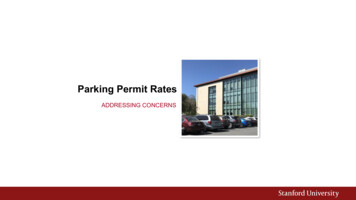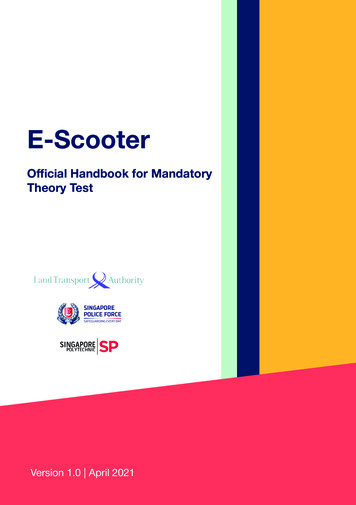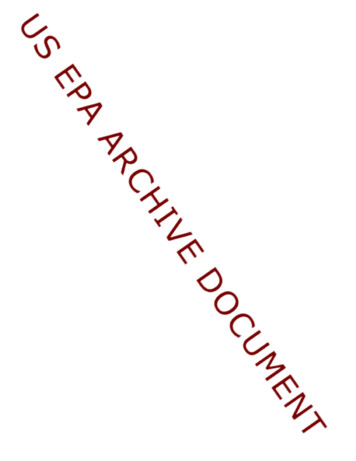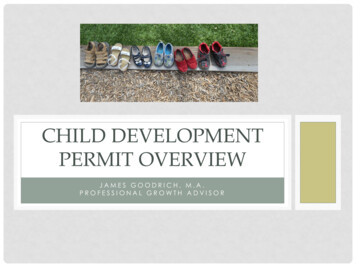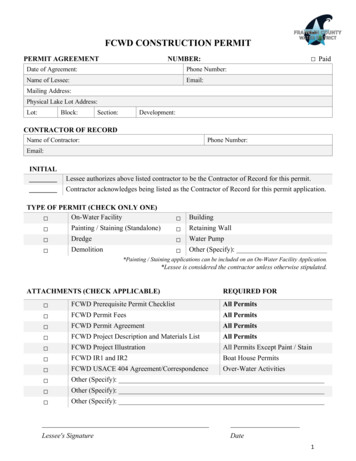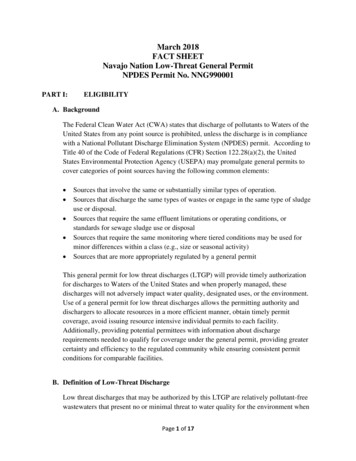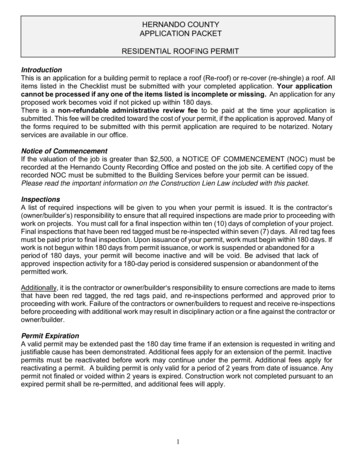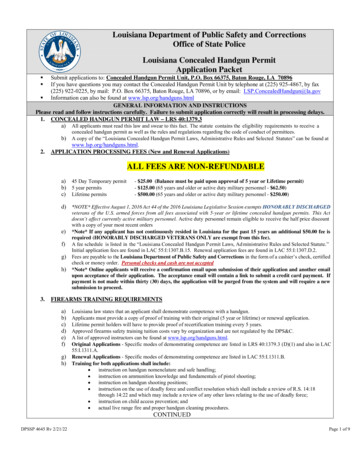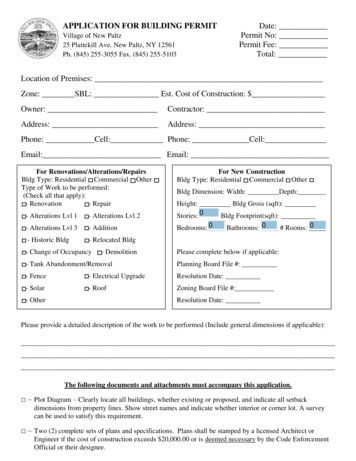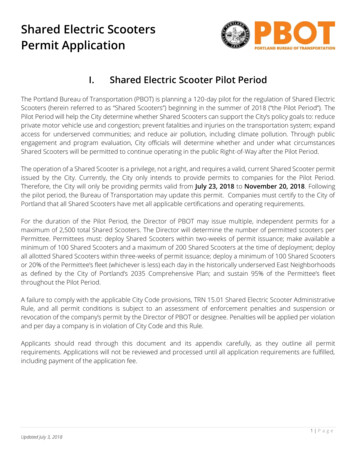
Transcription
Shared Electric ScootersPermit ApplicationI.Shared Electric Scooter Pilot PeriodThe Portland Bureau of Transportation (PBOT) is planning a 120-day pilot for the regulation of Shared ElectricScooters (herein referred to as “Shared Scooters”) beginning in the summer of 2018 (“the Pilot Period”). ThePilot Period will help the City determine whether Shared Scooters can support the City’s policy goals to: reduceprivate motor vehicle use and congestion; prevent fatalities and injuries on the transportation system; expandaccess for underserved communities; and reduce air pollution, including climate pollution. Through publicengagement and program evaluation, City officials will determine whether and under what circumstancesShared Scooters will be permitted to continue operating in the public Right-of-Way after the Pilot Period.The operation of a Shared Scooter is a privilege, not a right, and requires a valid, current Shared Scooter permitissued by the City. Currently, the City only intends to provide permits to companies for the Pilot Period.Therefore, the City will only be providing permits valid from July 23, 2018 to November 20, 2018. Followingthe pilot period, the Bureau of Transportation may update this permit. Companies must certify to the City ofPortland that all Shared Scooters have met all applicable certifications and operating requirements.For the duration of the Pilot Period, the Director of PBOT may issue multiple, independent permits for amaximum of 2,500 total Shared Scooters. The Director will determine the number of permitted scooters perPermittee. Permittees must: deploy Shared Scooters within two-weeks of permit issuance; make available aminimum of 100 Shared Scooters and a maximum of 200 Shared Scooters at the time of deployment; deployall allotted Shared Scooters within three-weeks of permit issuance; deploy a minimum of 100 Shared Scootersor 20% of the Permittee’s fleet (whichever is less) each day in the historically underserved East Neighborhoodsas defined by the City of Portland’s 2035 Comprehensive Plan; and sustain 95% of the Permittee’s fleetthroughout the Pilot Period.A failure to comply with the applicable City Code provisions, TRN 15.01 Shared Electric Scooter AdministrativeRule, and all permit conditions is subject to an assessment of enforcement penalties and suspension orrevocation of the company’s permit by the Director of PBOT or designee. Penalties will be applied per violationand per day a company is in violation of City Code and this Rule.Applicants should read through this document and its appendix carefully, as they outline all permitrequirements. Applications will not be reviewed and processed until all application requirements are fulfilled,including payment of the application fee.1 P a g eUpdated July 3, 2018
Shared Electric ScootersPermit ApplicationII.Permit Application InstructionsA. Application Submission and DeadlineApplications must either be emailed to e-scooter@portlandoregon.gov, or mailed to:Portland Bureau of TransportationRegulatory DivisionATTN: Erika Nebel1120 SW 5th Avenue, Suite 800Portland, OR 97204Permit Applications must be received by 11:59 p.m. (PDT) July 12, 2018 and submitted in a single PDF(partial packages will NOT be accepted). The City will make every effort to confirm receipt of an applicant’sApplication within two business days of application submission.B. Fee SchedulePermit Application Fee 250.00 (non-refundable)Pilot Permit Fee 5,000.00 (non-refundable)Per-Trip Surcharge 0.25 (invoiced monthly after commencement of operation)C. Fee and Surcharge PaymentThe Permit Application Fee is due at time of application submission and is non-refundable. If the Applicantis granted a permit, the application fee will be credited toward the Pilot Permit Fee. The Pilot Permit Fee isdue at the time of permit issuance and are non-refundable. The Per-Trip Surcharge must be paid within amonth of the invoice date after commencement of operation. Failure to fully and accurately pay fees andsurcharges may result in permit revocation. Payment can be made by check, Visa, MasterCard orAmerican Express.D. QuestionsQuestions can be directed to e-scooter@portlandoregon.gov or (503) 823-7483.2 P a g eUpdated July 3, 2018
Shared Electric ScootersPermit ApplicationIII.Application ChecklistThe checklist provided below should be used to ensure application completeness.IV.Application QuestionsA.Company OverviewB.Shared Scooter OverviewC.Maintenance & Operations PlanD.Safety History SummaryE.Complaint History SummaryF.Pricing & User Equity PlanG.Economic Opportunity PlanH.Communication & Outreach PlanI.Data Breach History ReportJ.Privacy PolicyK.Data Sharing AgreementV.Required DocumentationA.City of Portland Business LicenseB.Copy of Secretary of State RegistrationC.Proof of InsuranceD.Certificate of PCI ComplianceE.Shared Electric Scooter Company Permit ApplicationVI.AppendixA.Permit ApplicationB.Shared Scooter Unique Identification Master List TemplateC.East Pattern Neighborhoods MapD.Central City Bikeway Network MapE.High Crash Corridors MapF.Data Sharing Agreement SpecificationsG.Administrative Rule TRN-15.01 – Shared Electric Scooters3 P a g eUpdated July 3, 2018
Shared Electric ScootersPermit ApplicationIV.Application QuestionsA. Company Overview. Provide an overview of your company, along with:a) Every North American city that you currently operate, a local regulatory contact, and the number ofscooters in each.b) List all legal or regulatory enforcement actions, by type, initiated against the companyB. Shared Electric Scooter Description. Provide a detailed description of your scooter(s), includingplacement and size of the unique scooter identification and image(s) of the branded scooters youpropose for Portland.C. Maintenance & Operations Plana) Maintenance – describe:i) The frequency and extent of your maintenance and cleaning of scootersii) The type of labor (employees, staffing services, contract labor, etc.) conducting the workiii) The average lifespan of the scooter and scooter disposal practiceiv) The extent of scooter maintenanceb) Operations – describe:i) Hours of operationii) Pricing planiii) Storage of scooters during non-operational hoursiv) Proposed fleet size and service area at launch. Note that PBOT requires 20% of fleet to bedeployed daily with the East Neighborhoods Pattern Area, as shown in the Appendix.v) Methods and frequency of deploying, redistributing and charging scooters. How will you knowwhen the vehicle battery requires charging?vi) Process for receiving and resolving complaints and problems with scooters blocking the travelmovement in real-time (e.g., sidewalk, travel lane, etc.). Include the customer intake process, andstaffing levels. In what time frame are complaints acknowledged and resolved? (Communicationstrategies with users are listed later.)vii) Helmet distribution strategyb) Local Operator Contact Informationi) Provide the name, email, phone of your local operator, available by phone 24 hours/7 days a weekii) List address(es) of Portland operations and any storage facilitiesc) Customer Service Operationsi) Provide location(s) of your customer service operations.ii) Provide your 24-hour customer service number.iii) Does your customer service number provide the ability for translation services?4 P a g eUpdated July 3, 2018
Shared Electric ScootersPermit ApplicationB. Safety History Report. For each market that you operate, provide a summary report of safety incidents.The summary must include:a) Total number of reported and/or observed crashes and collisionb) Total number of reported injuries, separated by: minor injuries, major injuries resulting inhospitalization, fatal injuriesc) Total number of reported injuries that involved person(s) with a disabilityd) Total number of reported citations that involved a Usere) A summary of changes made by company or agency in response to safety incidentsC. Complaint History Reporta) Include total number and nature of complaints filed by Users and Non-Users, by city, and over whattimeframe.b) Average time taken to resolve complaints, by type.D. User Equity Plana) What strategies will you use to increase access and utilization of Shared Scooters among low-incomeand historically underserved communities?b) What will your discounted pricing be for people living on low-incomes?c) Describe any plans to offer a cash payment option.d) What languages are your services provided in?e) Are your apps and websites accessible and screen reader compatible?E. Economic Opportunity Plana) How will you create jobs for people living on low-income and traditionally underserved, includingpeople of color, low-income people, immigrants and refugees, veterans, people with disabilities,women, and formerly incarcerated people?b) How will you contribute to enhancing the economic and civic vitality of Portland?F. Communication & Outreach Plana) User Education: Describe your plan to educate and encourage user compliance with all applicablelaws, including minimum age, helmet requirements, and prohibition of sidewalk riding. To reducebarriers to access, PBOT discourages permittees from requiring driver’s license verification.b) General Public Communication: Describe your plan to communicate to the public on system use,driving safely around scooters, and how to report complaints. List the languages yourcommunications are provided in.G. Privacy Policya) Provide a copy of your privacy policy, and describe how you safeguard Users’ information, includingpersonal, financial, and travel information.b) List all of the parts of a User’s mobile phone (e.g., camera, location services, contacts) that arerequired by Applicant for access to its service. Why are they required? Does the company use this datafor other commercial purposes beyond the Shared Scooter service?5 P a g eUpdated July 3, 2018
Shared Electric ScootersPermit Applicationc) List additional elements a User’s mobile phone that are requested during the registration process orsubsequently. Why are they requested? Does the company use this data for other commercialpurposes beyond the Shared Scooter service?H. Data Breach History Report. See Appendix E for Data Sharing Agreement specifications.a) Provide a summary report describing the date, location, and type of data accessed for all databreaches.I.Data Sharing Agreementa) At time of application submission, Applicants must provide the City, either directly or through a Cityapproved third-party provider, access to:i) Real-time Availability data for their entire Portland fleet;ii) Archival Trip data for their entire Portland fleet;iii) Archival Collision data; andiv) Archival Complaint data.b) APIs should be RESTful, accessed via JSON Web Tokens (JWT), and return data in JSON format.c) APIs should provide only HTTPS endpoints.In addition, all Applicants must agree to distribute and provide the City access to:d) Results of a User survey, developed by the City and distributed by the Permittee during the PilotPeriod. Availability dataList publicly available API for real-time availability:Trip dataList API for archival data, to be updated daily:Collision dataList an API for archival data, to be updated daily:Complaint dataList an API for archival data, to be updated on the 15th and 30th of the month:User surveyDo you agree to distribute a City-developed User Survey and provide the City access to the surveyresults? Yes No6 P a g eUpdated July 3, 2018
Shared Electric ScootersPermit ApplicationV.Required DocumentationA. Permit Application – AppendixB. City of Portland Business License Certificate of Compliance – May be obtained from the PortlandRevenue Bureau (https://www.portlandoregon.gov/revenue/59484)C. Secretary of State Registration – Companies must be registered with the Oregon Secretary of er.aspx)D. Proof of InsuranceE. Certificate of Payment Card Industry (PCI) Compliance7 P a g eUpdated July 3, 2018
Shared Electric ScootersPermit ApplicationAPPENDIX A – SHARED ELECTRIC SCOOTER PERMIT APPLICATIONCONTACT INFORMATIONCOMPANY INFORMATIONTHE PORTLAND BUREAU OF TRANSPORTATION (PBOT) WILL ADMINISTER A 120-DAY PILOT FOR THE REGULATION OF SHARED ELECTRIC SCOOTERS(“SHARED SCOOTERS”) BEGINNING IN THE SUMMER OF 2018 (“THE PILOT PERIOD”). THE PILOT PERIOD WILL HELP THE CITY DETERMINE WHETHERSHARED SCOOTERS CAN SUPPORT THE CITY’S POLICY GOALS. WHILE TRN 15.01 MAY REMAIN IN EFFECT BEYOND THE END OF THE PILOT PERIOD, THECITY ONLY INTENDS TO PROVIDE PERMITS TO COMPANIES FOR THE PILOT PERIOD. COMPANIES MUST SECURE A PERMIT FROM PBOT TO OFFER SHAREDSCOOTERS FOR COMMERCIAL PURPOSES IN PORTLAND. THE OPERATION OF A SHARED SCOOTER IS A PRIVILEGE, NOT A RIGHT.COMPANY NAMEBUSINESS ADDRESSMAILING ADDRESS (IF DIFFERENT THAN BUSINESS ADDRESS)CITY, STATE, ZIP CODECITY, STATE, ZIP CODEPORTLAND BUSINESS LICENSE NUMBERODOT ACCOUNT NUMBERPRIMARY CONTACT NAMETITLEPHONE NUMBEREMAIL ADDRESSALTERNATE CONTACT NAMETITLEPHONE NUMBEREMAIL ADDRESSGENERAL CONTACT PHONE NUMBERGENERAL FAX NUMBER@@GENERAL CONTACT EMAIL ADDRESS@APPLICATION MATERIALSCITY OF PORTLANDBUSINESS LICENSEDATA SHARINGAGREEMENTISSUE DATESECRETARY OF STATEREGISTRATIONINITIALEXPIRATION DATEINITIALEXPIRATION DATEINITIALMAINTENANCE &OPERATIONS PLANINITIALINITIALECONOMICOPPORTUNITY PLANINITIALPAID APPLICATION FEEPRIVACY POLICYPROOF OF INSURANCEUSER EQUITY PLANCERTIFICATE OF PCICOMPLIANCEINITIALCOMMUNICATIONS &OUTREACH PLANINITIALINITIALSAFETY HISTORY REPORTDATA BREACH HISTORYREPORTINITIALCOMPLAINT HISTORYREPORTINITIALLOCAL AGENT CONTACTINFORMATIONINITIALBRANDING DESCRIPTION& RENDERINGCUSTOMER SERVICEINFORMATIONINITIALAGREE TO PARTICIPATEIN EVALUATIONINITIALLAUNCH SCHEDULE &SERVICE RATESINITIALNUMBER OF SHAREDSCOOTERS REQUESTEDINITIALNUMBERSIGNATURESI CERTIFY, BY SIGNING BELOW, EACH CRITERION OUTLINED IN TRN 15.01 HAS BEEN MET AND WILL BE CORRECT AND ACCURATE UPON AN AUDITCONDUCTED BY THE PORTLAND BUREAU OF TRANSPORTATION. THE APPLICANT AGREES TO PARTICIPATE IN THE EVALUATION OF THE PILOT PERIOD BYDISTRIBUTING A CITY SURVEY TO ITS USERS. FAILURE TO COMPLY WITH CITY CODE, TRN 15.01, AND PERMIT CONDITIONS MAY RESULT IN ONE OR MOREOF THE FOLLOWING: CIVIL PENALTY, VEHICLE IMPOUND, SUSPENSION OR REVOCATION OF THE SHARED ELECTRIC SCOOTER COMPANY PERMIT. I FURTHERAGREE TO INDEMNIFY, DEFEND, AND HOLD THE CITY OF PORTLAND AND ITS ELECTED OFFICIALS, OFFICERS, EMPLOYEES, AND AGENTS HARMLESS FROMAND AGAINST ALL CLAIMS ARISING FROM, IN WHOLE OR IN PART, THE APPLICANT’S OPERATIONS UNDER THIS PERMIT.PLEASE PRINT NAMESIGNATURETITLE OF SIGNORDATEPBOT USEDATE STAMP DOCUMENTS RECEIVEDDOCUMENTS RECEIVED BYAPPLICATION FULFILLS MATERIAL REQUIREMENTS (INITIAL, DATE)PERMIT APPROVED BYPERMIT DENIEDISSUED PERMIT DATEPERMIT APPROVEDNUMBER OF APPROVED SHARED SCOOTERSFULL DEPLOYMENT DATE8 P a g eUpdated July 3, 2018
Shared Electric ScootersPermit ApplicationAppendix B – Shared Scooter Unique Identification Number Master ListReporting:Permit stickers:Enforcement:Company Name:Unique IDThe Permittee must submit the Shared Scooter Unique Identification Numbers Master List(herein referred to as the “Master List”) before the permit is issued. The Permittee isresponsible for: sending PBOT a Master List of the unique ID of each Shared Scooter inoperation and the corresponding permit ID before deployment; and sending PBOT a complete,accurate, and updated Master List, per the data-sharing agreement.Permit stickers with unique identification numbers will be distributed to each Permittee.Permittees are responsible for: affixing stickers on each Shared Scooter in operation; destroyingpermit stickers of decommissioned Shared Scooters; and affixing new stickers to SharedScooters added to the permitted fleet. PBOT may change the method of distributing stickers atany point in the Pilot Period.Vehicles must be made available for compliance audits and enforcement actions upon request,pursuant to this application and TR-15.01 Shared Electric Scooter Administrative Rule.Date:Permit Sticker IDPermittee Signature:PBOTUSEPrinted name:Title:Permit No.:Printed name:Phone:Date:Today’s date:Phone:Signature:9 P a g eUpdated July 3, 2018
Shared Electric ScootersPermit ApplicationAppendix C – East Neighborhoods Pattern Area MapLink to full map online: cle/69018910 P a g eUpdated July 3, 2018
Shared Electric ScootersPermit ApplicationAppendix D – Portland Central City Bike MapLink to full map online: x.html11 P a g eUpdated July 3, 2018
Shared Electric ScootersPermit ApplicationAppendix E – High Crash Corridor MapLink to online version: tml12 P a g eUpdated July 3, 2018
Shared Electric ScootersPermit ApplicationAppendix F – Data Sharing Agreement SpecificationFILESThis specification is a modified version of General Bikeshare Specification Feed (GBFS) and defines thefollowing files along with their associated content:File NameRequiredDefinesAuto-discovery file that links to all of the other filespublished by the system. This file is optional, but highlygbfs.jsonYesrecommended. This file is optional for GBFS but required forShared Electric Scooters.Describes the system including System operator, Systemsystem information.jsonYeslocation, year implemented, URLs, contact info, time zoneMostly static list of all stations, their capacities andstation information.jsonN/Alocations. This file is a requirement for GBFS but not applicableto Shared Electric Scooters.Number of available devices and docks at each station andstation status.jsonN/Astation availability. This file is a requirement for GBFS but notapplicable to Shared Electric Scooters.Describes devices that are available in non station-basedfree device status.jsonYessystems. This file is optional for GBFS but required for SharedElectric Scooters.Describes the hours of operation for the system. This file issystem hours.jsonYesoptional for GBFS but required for Shared Electric Scooters.Describes the days of operation for the system. This file issystem calendar.jsonYesoptional for GBFS but required for Shared Electric Scooters.system regions.jsonOptionalDescribes the regions the system is broken up intoDescribes the system pricing. This file is optional for GBFS butsystem pricing plans.jsonOptionalrequired for Shared Electric Scooters.system alerts.jsonOptionalDescribes current system alerts 13 P a g eUpdated July 3, 2018
Shared Electric ScootersPermit ApplicationAVAILABILITYDescribes devices that are not at a station and are not currently in the nmiddle of an active ride. TheAPI should allow queries by company name, device type, device id, availability start time, andavailability end time. free device status.json Endpoint: /availability.json Method: GET Response:Field NameTypeRequired Definescompany nameStringYesValue from Device Type enumeration below.device typeNumber Yesdevice idStringYesUUID of a scooter, bike, or otherbattery levelNumber YesIf electric powered, display battery life in percentage fullGeoJSON Point object. Must be in WGS 84 (EPSG:4326)locationObjectYesstandard GPS projection.placement reasonNumber YesValue from the Placement Reason enumeration belowIndicates whether provider believes placement wasallowed placementBoolYesallowable under service area rules.pickup reasonNumber YesValue from the Removal Reason enumeration below.is reservedBoolean Yesis the device currently reserved for someone elseis disabledBoolean Yesis the device currently disabled (broken)availability start time Number Required Unix timestampUnix timestamp. Null/undefined interpreted as stillavailability end time Number Noavailable. 14 P a g eUpdated July 3, 2018
Shared Electric ScootersPermit ApplicationTRIPS A trip represents a journey taken by a User with a geo-tagged start and stop point. The trips API allows a user to query historical trip data. The API should allow querying trips at least by ID, location, and date/time. Endpoint: /trips.json Method: GETField NameTypeRequired Othercompany nameStringYesdevice typeNumber YesValue from Device Type enumeration belowdevice idStringYesUUIDtrip idStringYesUUID for each triptrip durationNumber YesTime, in Secondstrip distanceNumber YesTrip Distance, in MetersGeoJSON Point object. Must be in WGS 84 (EPSG:4326)start pointObjectYesstandard GPS projectionGeoJSON Point object. Must be in WGS 84 (EPSG:4326)end pointObjectYesstandard GPS projectionThe approximate level of accuracy, in meters, representedaccuracyNumber Yesby start point and end pointGeoJSON Line object. Must be in WGS 84 (EPSG:4326)routeObjectYesstandard GPS projection.sample rateNumber NoThe frequency, in seconds, in which the route is sampledstart timeNumber YesUnix timestampend timeNumber YesUnix timestampAn absolute URL to a photo (or other evidence) of properparking verificationStringNovehicle parkingThe cost, in cents that it would cost to perform that trip instandard costNumber Nothe standard operation of the SystemThe actual cost, in cents paid by the user of the Mobility asactual costNumber Noa service providermax speedNumber NoMaximum speed in miles per houraverage speedNumber NoAverage speed in miles per hourpayment typeNumber YesValue from Authorization Type, enumeration belowpayment accessNumber YesValue from Authorization Type, enumeration below15 P a g eUpdated July 3, 2018
Shared Electric ScootersPermit ApplicationCOLLISIONSCollision API allows a user to query historical collision data. The API should allow querying trips at leastby ID, location, and date/time. Endpoint: /collisions.json Method: GET Response:Field NameTypeRequiredOtherdateNumber YesUnix Timestampcompany nameStringYesValue from Device Type enumeration below. The type ofdevice typeNumber Yesdevice involved in the collision.device idStringYesUUID of a scooter, bike, or otherother userBoolean YesWas a second person involved in the collision?Value from Device Type enumeration below. The secondother vehicleStringYesdevice involved in the collision.trip idStringYesUUID of the active trip when the collision occurred.GeoJSON Point object. Must be in WGS 84 (EPSG:4326)locationObjectYesstandard GPS projection.helmetBoolean YesWas there a helmet warn by device User?citationBoolean YesWas there a police citation issued to the User?citation detailsStringYesIf Yes, list violation(s) or enter N/AinjuryBoolean YesWere there injuries?state reportBoolean YesWas a report filed with State of Oregon DMV?Value from the Status enumeration below. Null/undefinedclaim statusNumber Yesinterpreted as not applicable.An array of absolute URLs to PDFs or photos of anyrelevant incident and/or police reports.reportsArrayYesNull/undefined/empty array is interpreted as N/A 16 P a g eUpdated July 3, 2018
Shared Electric ScootersPermit ApplicationCOMPLAINTSComplaints API allows a user to query historical complaint data. The API should allow querying at leastby complaint type, location, and date/time. Endpoint: /complaints.json Method: GET Response:Field NameTypeRequired Othercompany nameStringYesType of shared device (escooter, ebike, scooter, bike,device typeStringYesother)device idStringNoUUID of a scooter, bike, or other.date submittedNumberYesUnix timestampGeoJSON Point object. Must be in WGS 84 (EPSG:4326)locationObjectYesstandard GPS projection.complaint typeStringYesValue from Complaint Type enumeration below.complaint detailsStringYesText of complaint.An array of absolute URLs to photos or relevant files.complaintsArrayYesNull/undefined/empty interpreted as N/A ENUMERATIONSThe following is a list of enumerated values that are referenced in the above API specifications. Theidentity value is what will be in the field value, while the textual value is a display value or otherwisedescriptive value.DEVICE TYPEIdentity ValueTextual value1Electric scooter2Electric bicycle3Scooter4Bicycle5None - Pedestrian6Motor vehicle7AV Motor vehicle8TNC Private-for-hire vehicle9AV Private-for-hire vehicle10Taxi11Pedicab12Bus13Motorcycle14Personal Assisted Mobility Device15Private or public agency transit vehicle 17 P a g eUpdated July 3, 2018
Shared Electric ScootersPermit Application16OtherPLACEMENT REASONIdentity Value12Textual valueUserRebalancingPICKUP REASONIdentity Value1234Textual valueUserRebalancingOut of service areaMaintenanceAUTHORIZATION TYPEIdentity Value12Textual valuePhone scanPhone textSTATUSIdentity Value12Textual valueOpenClosedCOMPLAINT TYPEIdentity Value123456789101112Textual valueDevice found blocking pedestrian right-of-wayDevice found blocking bike-pathDevice found inside or blocking access to a buildingDevice found blocking MAX or Streetcar tracksDevice found blocking vehicle travel laneDevice listed as available, but physically inaccessibleUnpermitted company, vehicleUnsafe or unsanitary vehicle, damaged or missing equipment, vehicle indisrepairFare greater than expected, extra charges, or un-identifiable chargesadded to fareUser not wearing a helmetUser observed riding on sidewalkOther18 P a g eUpdated July 3, 2018
TRN-15.01 – New Mobility – Shared Electric ScootersAdministrative Rule Adopted by Portland Bureau of Transportation Pursuant to ORS221.495 and Portland City Code 3.12.010.Under the authority of ORS 221.495 and PCC 3.12.010, I am adopting this AdministrativeRule TRN-15.01 (“this Rule”) to establish the Bureau’s Shared Electric Scooter policy,regulations, and permit requirements. Because there is an urgent need to ensure the publicRight-of-Way (ROW) continues to be managed in a manner that upholds public safety, I willimplement this Rule upon its adoption.1.PurposeThis Rule regulates Shared Electric Scooters (“Shared Scooters”), defined below, inPortland, Oregon. The operation of a Shared Scooter is a privilege, not a right. For acompany to offer Shared Scooters for commercial purposes in Portland, the companyowning or offering Shared Scooters must obtain a permit. Companies must certify tothe City of Portland that all Shared Scooters have met all applicable certificationsand operating requirements. A failure to comply with the applicable City Codeprovisions, this Rule, and all permit conditions is subject to an assessment of civilpenalties and suspension or revocation of the company’s permit by the Director ofthe Bureau of Transportation (“PBOT”) or designee. Penalties will be applied perviolation and per day a company is in violation of City Code and this Rule.PBOT is planning a 120-day pilot for the regulation of Shared Scooters beginning inthe summer of 2018 (“the Pilot Period”). The Pilot Period will help the Citydetermine whether Shared Scooters can support the City’s policy goals. While thisRule may remain in effect beyond the end of the Pilot Period, the City only intendsto provide permits to companies for the Pilot Period. If a permanent permittingprogram is implemented, this Rule will be updated accordingly.A.For the duration of the Pilot Period, the Director of PBOT may issue multiple,independent permits for a maximum of 2,500 total Shared Scooters. TheDirector will determine the number of overall permitted Shared Scooters andpermitted Shared Scooters per Permittee throughout the Pilot Period.Throughout the Pilot Period, Permittees will be expected to report on andmitigate impacts as described in this Rule. PBOT may update this Rule at anytime.1 Page
B.2.Policy Goals. Shared Scooters should contribute to:1.Reducing private motor vehicle use and congestion.2.Preventing fatalities and injuries on the transportation system.3.Expanding access for underserved communities.4.Reducing air pollution, including climate pollution.C.The provisions of this Rule complement, but do not replace, any provisionsin Portland City Code. In case of a conflict, the City Code will prevail overthis Rule.D.Shared Scooter fees, surcharges and penalties will be placed in a NewMobility Account to be used by PBOT for administration and enforcement;evaluation; safe travel infrastructure; and expanded and affordable access.AuthorityThese rules are authorized by, and implement, in relevant part, the following CityCharter and Code provisions, as may be amended from time to time:A.B.City Charter section 2-105(a), which gives the City the “power andauthority”:5.To exercise within the City and City-owned property, all the powerscommonly known as the police power to the same extent as the Stateof Oregon has or could exercise said power within said areas, and tomake and enforce within said areas all necessary or appropriate local, police, and safety laws and regulations 6.To secure the protection of persons and property and to provide forthe . . . safety and good order of the City 23.To regulate and control for any and every purpose the use of streets,highways, alleys, sidewalks, public thoroughfares, and public placeswithin the City and to regulate the use of streets, roads, highwaysand public places for transportation or use of every description, andfor installation of any kind.26.To control and limit traffic and classes thereof, and vehicles andclasses thereof on the streets, avenues and elsewhere City Code section 3.12.010: “The Bureau of Transportation shall be charged2 Page
with the responsibility for the operation of the transportation system The Director of Transportation shall have authority to issueAdministrative Rules and regulations in addition to those specified in theCharter and this Code, as are appropriate to provide for the adequatefunctioning of the Bureau and to carry out the responsibilities under thisSection.”C.City Code section 16.10.100: “As the City’s elected body, the City Councilis the road authority for all public streets, except state highways, as designatedby State Law. The City Council may delegate specific road authority to theCity Traffic Engineer, City Engineer or Emergency Incident Commander asthe Council deems appropria
The Portland Bureau of Transportation (PBOT) is planning a 120-day pilot for the regulation of Shared Electric Scooters (herein referred to as "Shared Scooters") beginning in the summer of 2018 ("the Pilot Period"). The Pilot Period will help the City determine whether Shared Scooters can support the City's policy goals to: reduce
